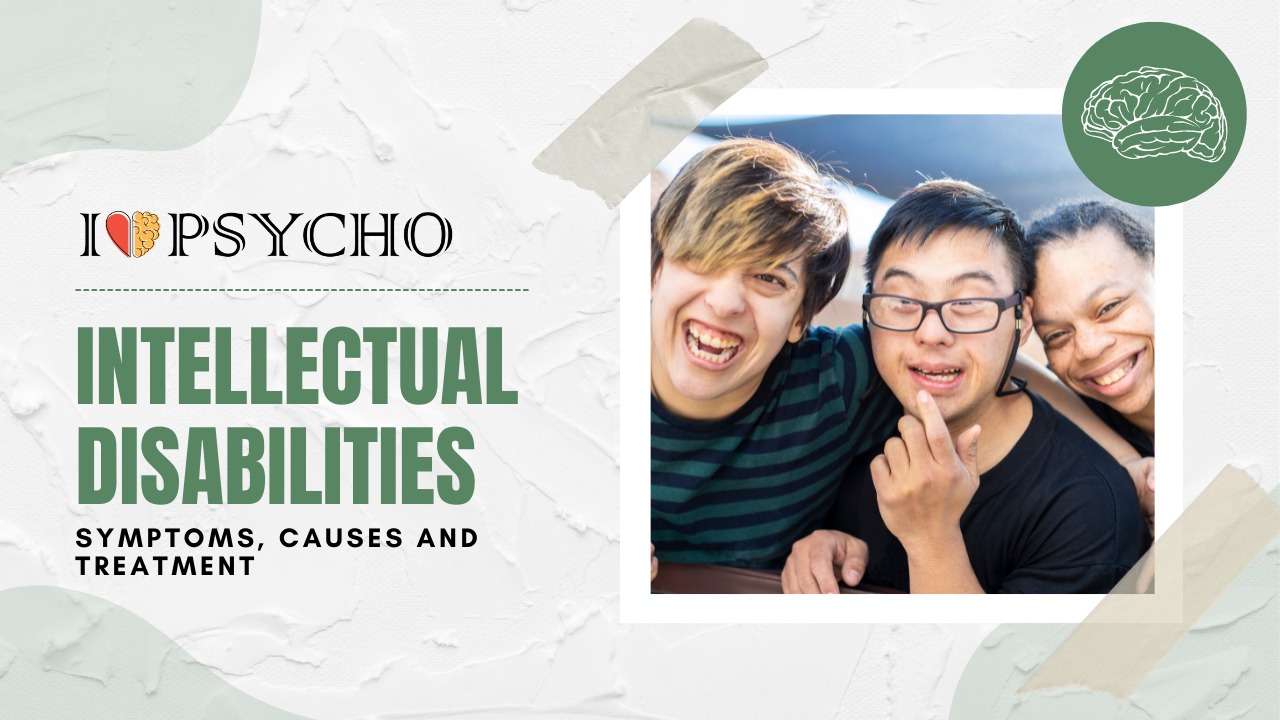What are Intellectual Disabilities?
Intellectual disability (ID), once called mental retardation, is characterized by below-average intelligence or mental ability and a lack of skills necessary for day-to-day living. People with intellectual disabilities can and do learn new skills, but they learn them more slowly.

There are varying degrees of intellectual disability, from mild to profound. The term “mental retardation” is no longer used, as it is offensive and has a negative tone. aSomeone with an intellectual disability has limitations in two areas. These areas are:
Intellectual Functioning

Also known as IQ, this refers to a person’s ability to learn, reason, make decisions, and solve problems.
Adaptive Behaviors
These are skills necessary for day-to-day life, such as being able to communicate effectively, interact with others, and take care of oneself.
IQ (intelligence quotient) is measured by an IQ test. The average IQ is 100, with the majority of people scoring between 85 and 115.
A person is considered intellectually disabled if they have an IQ of less than 70 to 75.
To measure a child’s adaptive behaviors, a specialist will observe the child’s skills and compare them to other children of the same age.

Things that may be observed include how well the child can feed or dress themselves; how well the child is able to communicate with and understand others; and how the child interacts with family, friends, and other children of the same age.
Intellectual disability is thought to affect about 1% of the population. Of those affected, 85% have mild intellectual disability. This means they are just a little slower than average to learn new information or skills. With the right support, most will be able to live independently as adults.
Signs/ Symptoms of Intellectual Disabilities
There are many different signs of intellectual disability in children. Signs may appear during infancy, or they may not be noticeable until a child reaches school age. It often depends on the severity of the disability. Some of the most common signs of intellectual disability are:
Rolling over, sitting up, crawling, or walking late
By 4 months, many babies can roll from their stomachs to their backs. At 6 months, many babies begin rolling from their backs to their stomachs. If a baby cannot roll in either direction by 6 months, it may indicate a developmental delay.

Most children are able to walk alone by 11-15 months, but, some aren’t able to. Some children cannot walk, walk or sit when they should and suffers from this condition.
Talking late or having trouble with talking
Research suggests children with intellectual disabilities (ID) experience difficulties in communication. This is a physical disorder that makes it hard to form sounds in the right sequence to form words.

Children with ID generally start talking late and have a problem while communicating.
Slow to master things like toilet training, dressing, and feeding themselves
For children with ID, toilet training can be more difficult because of how they may perceive or react to the different sensations related to toileting.

Some children might be slow in dressing and feeding themselves.
Difficulty remembering things
Children with Intellectual Disabilities would perform generally poor on the memory tasks than the average-ability control group. There are many reasons kids are forgetful, including stress and lack of sleep.

Being hungry can also have a big impact. But sometimes when kids have trouble remembering information, they may be struggling with a skill called working memory.
Inability to connect actions with consequences

Children diagnosed with this disability are unable to connect actions to consequences.
Behavior problems such as explosive tantrums

Children with ID are also often prone to dramatic meltdowns.
These children tend to be rigid

dependent on a consistent routine for their emotional comfort—and any unexpected change can set them off.
Difficulty with problem-solving or logical thinking
children with this disorder have problems in logical thinking and problem-solving.

In children with severe or profound intellectual disability, there may be other health problems as well. These problems may include seizures, mood disorders (anxiety, autism, etc.), motor skills impairment, vision problems, or hearing problems.
Causes of Intellectual Disabilities
Anytime something interferes with normal brain development, intellectual disability can result. However, a specific cause for intellectual disability can only be pinpointed about a third of the time.

The most common causes of intellectual disability are:
- Genetic conditions. These include things like Down syndrome and fragile X syndrome.
- Problems during pregnancy. Things that can interfere with fetal brain development include alcohol or drug use, malnutrition, certain infections, or preeclampsia.
- Problems during childbirth. Intellectual disability may result if a baby is deprived of oxygen during childbirth or born extremely premature.
- Illness or injury. Infections like meningitis, whooping cough, or measles can lead to intellectual disability. Severe head injury, near-drowning, extreme malnutrition, infections in the brain, exposure to toxic substances such as lead, and severe neglect or abuse can also cause it.
- None of the above. In two-thirds of all children who have intellectual disabilities, the cause is unknown.
Diagnosis of Intellectual Disabilities
Intellectual disability may be suspected for many different reasons. If a baby has physical abnormalities that suggest a genetic or metabolic disorder, a variety of tests may be done to confirm the diagnosis. These include blood tests, urine tests, imaging tests to look for structural problems in the brain, or electroencephalogram (EEG) to look for evidence of seizures.
In children with developmental delays, the doctor will perform tests to rule out other problems, including hearing problems and certain neurological disorders. If no other cause can be found for the delays, the child will be referred for formal testing.

Three things factor into the diagnosis of intellectual disability: interviews with the parents, observation of the child, and testing of intelligence and adaptive behaviors. A child is considered intellectually disabled if they have deficits in both IQ and adaptive behaviors. If only one or the other is present, the child is not considered intellectually disabled.
After a diagnosis of intellectual disability is made, a team of professionals will assess the child’s particular strengths and weaknesses. This helps them determine how much and what kind of support the child will need to succeed at home, in school, and in the community. “You can refer to a psychologist or a psychiatrist if you feel like you have any of those symptoms.”
Treatment/Prevention of Intellectual Disabilities
Intellectual disability is a lifelong condition. Although there is currently no cure, most people can learn to improve their functioning over time. Receiving early, ongoing interventions can often improve functioning, thereby allowing someone to thrive.
Most treatment plans for intellectual disability focus on the people:
- strengths
- needs
- support needed to function
- additional conditions
Many services exist to help people with intellectual disabilities and their families get the support they need. Most of these services allow someone with an intellectual disability to function normally in society. Someone’s diagnosis typically determines which services and protection of rights, such as special education or home or community services, they are eligible to receive under federal or national law. It also usually helps determine which supportive services they may need.

Supportive services include:
- early interventions that work to identify intellectual disability in infants and toddlers
- special education and academic support, such as individual education plans, which are available in the U.S. under federal law for free to every child with intellectual disability
- transition services that help people with intellectual disabilities transition to adulthood after high school
- day programs
- vocational programs, such as job coaching or skill learning
- housing options
- case managers to help coordinate services and ensure that the individual receives proper care
- psychological or psychiatric services
- speech and language pathology or audiology services
- therapeutic recreation
- rehabilitation counseling
- adapted equipment or assistive technology
Family members, caregivers, friends, co-workers, and community members can also provide additional support to people with intellectual disabilities. With proper support and treatment, most people with intellectual disabilities are capable of achieving successful, production roles in their communities. However, how well someone is able to cope and function with an intellectual disability is also dependent on the severity of their condition and any other underlying genetic or medical conditions they have.
THE BOTTOM LINE
People with intellectual disabilities have varying limits to their ability to learn and function in society, and they often learn slower than others. However, receiving early, ongoing treatment in the form of supportive services can often help people with intellectual disabilities function normally or independently. Contact a doctor as soon as possible if a child has any signs or symptoms of intellectual disability.
Further Reading:









